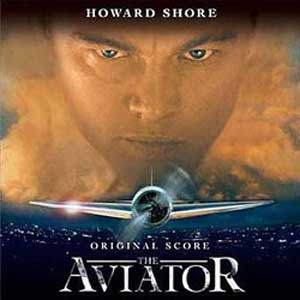The Aviator
Composed, orchestrated, conducted, and produced by Howard Shore
Performed by The Flemish Radio Orchestra
Available on Decca 210 3579
Running Time: 47:23
Crotchet Amazon UK Amazon US

Martin Scorsese’s The Aviator, this year’s leading contender for the Oscars, is a suitably stylish exposition of a visionary – albeit eccentric – American giant, one Howard Hughes. Technically, the film is brilliant as it mirrors the biographical genesis of events leading up to Hughes’s legendary 1947 flight on the Hercules. Filmographically, it looks back to a 1960s expressionism – think Michael Powell – but musically composer Howard Shore takes a more literal view of Hughes and his achievements.
The splendid opening track – ‘Icarus’ – is almost a contradiction: Shore writes that the music of the film describes the world of Howard Hughes from 1927-47, yet the effect here is so Baroque – even Handelian - in mood that it seems out of place. On the other hand, tracks such as ‘Howard Robard Hughes, Jnr.’ and the castanet and guitar influenced ‘7000 Romaine’ fall neatly into the period with its Spanish instrumentation and orchestration recalling the splendour of Californian architecture at the time. If Hughes was latterly remembered as a pioneer of aviation, however (and Shore’s scoring is usually skittish enough, if without the idiomacy of the dogfight itself), he also takes up the theme of Hughes the pioneer of cinema. Bridging the gulf between silent movies and the first sound movies, Hughes was an innovator, although not always a great one. The aviation movie Hell’s Angels, made in 1927/8, Hughes made into a talking movie (his previous aviation film, Wings, having relied on soundtrack only) and in ‘Hollywood 1927’ Shore consciously includes an excerpt from Adolph Tandler’s original score
.The first movement of Tchaikovsky’s Sixth is quoted in ‘Long Beach Harbour 1947’, evocatively played beneath news sound footage of the time, but in general Shore’s score does not venture beyond the special, and in places it is little more than downright utilitarian. There is an over-reliance on proto-Shostokovichian broodiness (‘Screening Room’ is drenched in a Soviet-type bleakness), and a despairing harmony to tracks such as ‘The Germ Free Zone’, with its fragmented instrumentation mainly given over to chillingly played woodwind solos. Where one would have expected Shore to have mimicked the on-screen monumentalism, such as in ‘The Mighty Hercules’ (the largest plane of its type ever built), Shore seems to depict it musically as without scale.
More impressive than much of the music is the playing of the Flemish Radio Orchestra. With an oakey, deep-grained sound that recalls orchestras from the period, it conveys a classicism largely removed from the composer’s score.
Marc BridleNot rated.
Return to Index